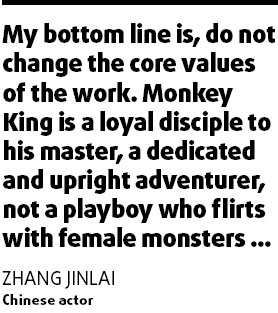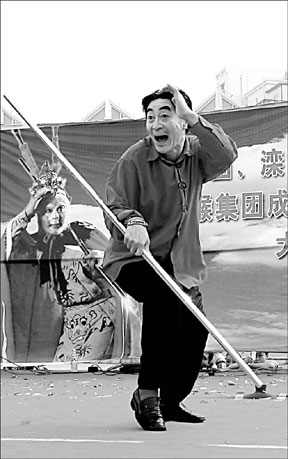Monkey magic man
There are thousands of versions of Journey to the West (Xi You Ji), but what is the Monkey King's interpretation of the book?
Zhang Jinlai, a household name for his portrayal of the Monkey King in the 1986 TV adaptation of the novel, has recently released the second installment of Liu Xiao Ling Tong's Interpretation of Journey to the West, using his stage name in the title.
In the book, Zhang shares his understanding of the Monkey King, the novel and its author Wu Cheng'en. In his opinion, the Monkey King is the story's leading character.
|
Zhang Jinlai at a gala show held in Henan province. Zhang Yongxin |
"Many may disagree, but I think Monkey King best displays the core values of Journey to the West - a strong will and optimistic attitude facing hardships," he says in an interview with China Daily.
For example, he says, the Monk Xuanzang and his three disciples, including Monkey King, experienced 81 severe tests in their adventures, but they never gave up. As the most powerful disciple, Monkey King easily overcame every hardship and never feared. Although Monk Xuanzang was often deceived by monsters, he never begrudged his master.
Thanks to his performance in the hit TV series, which has been aired more than 700 times, Zhang's name is synonymous with the Monkey King for many Chinese people. But few of them would have guessed he didn't like monkeys at all as a boy.
"I can say that the first thing I saw in this world was my father's 'monkey face'," he says, laughing loudly.
Zhang's father Zhang Zongyi was known as "Monkey King of the South". He was one of the two most famous performers then specializing in playing monkeys.
Since the publication of Journey to the West, monkey stories were popular in many local operas, including those in Shaoxing city, Zhejiang province, Zhang's hometown. But it was Zhang's father who made the monkey performance a signature program in Shaoxing opera, after years of studying opera and real monkeys.
Monkeys were Zhang's first teachers. There were 11 children in Zhang's family, but there were more monkeys. He grew up with them, in the house and courtyards. Zhang did not like them at first because they would sometimes attack him.
A shy and physically fragile boy, Zhang was not considered a heir to the family's tradition. Instead, it was his second brother Zhang Jinxing who seemed destined to be the next Monkey King, because of his talent on the stage at just seven.
But Jinxing died of leukemia at 16. On his deathbed he told his grieving brother: "If you want to see me again, you must become Monkey King."
According to tradition, the art can only be passed to male successors and the rest of the boys in the family either did not want to do it or were physically unsuitable.
"I had no choice," Zhang recalled. "It turned to be an obligation for me to inherit the art. Of course, my brother's last words were another important reason."
Soon after Zhang began training, the "cultural revolution" (1966-76) ended his father's stage life. Opera was forbidden, too. He had to learn secretly at 5 am every morning before he went to school. For a long time his classmates did not know about his "secret mission".
Some of them even wrote letters to him asking whether it was really him playing Monkey King when the TV series became a hit, because they could not believe their introspective classmate was the energetic monkey on screen.
In 1982, when his father recommended him to Yang Jie, director of the TV series Journey to the West, Yang's first impression of the 23-year-old Zhang was that he was too gentle to be a Monkey King.
"Monkey King and his master experienced 81 tests on the road, but the difficulties I experienced shooting were far more than that," Zhang says.
As the son of "Monkey King of the South", there was a lot of pressure on Zhang.

"You just do a good job. No one will praise you, because that's something you should do. But if you do it poorly, it's all your fault."
Monkey King was said to have "fiery eyes and golden eyeballs", a sure sign of whether you are a human or monster. But Zhang was shortsighted. His eyes were fine for the stage but close-ups on TV were a challenge. So, he got up early every morning to gaze at the sun, despite his gushing tears. He chased, with his eyes, all moving objects, such as birds, ping-pong balls and even candle light so that he had the right look.
In one scene Monkey King is burnt by a monster's badly behaved son. Zhang was almost suffocated by the heavy smoke and petrol on his body.
"After all, I was not the almighty Monkey King," he says jokingly.
The series was a huge success quickly making Zhang a celebrity. He admits that he was lucky to play the popular role when TV series were in their heyday. Now people have more choices if they want to approach the classics, which Zhang is happy to see. He has no time for malicious spoofing of the classics, though.
"My bottom line is, do not change the core values of the work. Monkey King is a loyal disciple to his master, a dedicated and upright adventurer, not a playboy who flirts with female monsters. The book is about strong will overcomes difficulties, not triangular love affairs between Monkey King, his master and monsters. I have met children who asked me why Monkey King has girlfriends. How should I answer them?"
Zhang says he disagreed with the idea that parodies emerge because they have a market. "They say people like spoofs, but the fact is the 1986 TV series is still the most popular version."
Zhang has been working on a TV series named Wu Cheng'en and Journey to the West (Wu Cheng'en and Xi You Ji), which shows how the classic was written. His lifelong dream, however, has been to shoot a film about Monkey King. And this may come true as an international production is in the works, he says.
At 49, Zhang has one daughter. He does not care about the old tradition of excluding girls from portraying Monkey King, but she would rather do something else than become an actress. Zhang respects her opinion and says he is not anxious to find a disciple.
"The best candidate has not appeared. He or she can be Chinese or a foreigner, but they have to be someone who really loves Chinese culture."
(China Daily 03/18/2008 page20)















